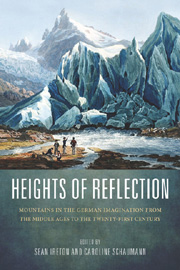 Heights of Reflection
Heights of Reflection Book contents
- Frontmatter
- Contents
- Acknowledgments
- Introduction: The Meaning of Mountains: Geology, History, Culture
- Prelude: Classical Mountain Landscapes and the Language of Ascent
- Part I First Forays: Mountain Exploration and Celebration from the Middle Ages to the Eighteenth Century
- Part II Beckoning Heights: Summits Near and Far in the Nineteenth Century
- Part III Modern Expeditions and Evocations: Climbing from the Twentieth into the Twenty-First Century
- Leaving the Summit Behind: Tracking Biographical and Philosophical Pathways in Richard Strauss's Eine Alpensinfonie
- Elevation and Insight: Thomas Mann's Der Zauberberg
- “The Essence of the Alpine World Is Struggle”: Strategies of Gesundung in Arnold Fanck's Early Mountain Films
- “Mountain of Destiny”: The Filmic Legacy of Nanga Parbat
- Spatial Orientation and Embodied Transcendence in Werner Herzog's Mountain Climbing Films
- W. G. Sebald's Magic Mountains
- Conflicting Ascents: Inscriptions, Cartographies, and Disappearance in Christoph Ransmayr's Der fliegende Berg
- Works Cited
- Notes on the Contributors
- Index
“The Essence of the Alpine World Is Struggle”: Strategies of Gesundung in Arnold Fanck's Early Mountain Films
from Part III - Modern Expeditions and Evocations: Climbing from the Twentieth into the Twenty-First Century
Published online by Cambridge University Press: 05 February 2013
- Frontmatter
- Contents
- Acknowledgments
- Introduction: The Meaning of Mountains: Geology, History, Culture
- Prelude: Classical Mountain Landscapes and the Language of Ascent
- Part I First Forays: Mountain Exploration and Celebration from the Middle Ages to the Eighteenth Century
- Part II Beckoning Heights: Summits Near and Far in the Nineteenth Century
- Part III Modern Expeditions and Evocations: Climbing from the Twentieth into the Twenty-First Century
- Leaving the Summit Behind: Tracking Biographical and Philosophical Pathways in Richard Strauss's Eine Alpensinfonie
- Elevation and Insight: Thomas Mann's Der Zauberberg
- “The Essence of the Alpine World Is Struggle”: Strategies of Gesundung in Arnold Fanck's Early Mountain Films
- “Mountain of Destiny”: The Filmic Legacy of Nanga Parbat
- Spatial Orientation and Embodied Transcendence in Werner Herzog's Mountain Climbing Films
- W. G. Sebald's Magic Mountains
- Conflicting Ascents: Inscriptions, Cartographies, and Disappearance in Christoph Ransmayr's Der fliegende Berg
- Works Cited
- Notes on the Contributors
- Index
Summary
“Die Filme,” Siegfried Kracauer claimed in 1927,
sind der Spiegel der bestehenden Gesellschaft.… Um die heutige Gesellschaft zu erforschen, hätte man also den Erzeugnissen ihrer Filmkonzerne die Beichte abzunehmen.… In der unendlichen Reihe der Filme kehrt eine begrenzte Zahl typischer Motive immer wieder; sie zeigen an, wie die Gesellschaft sich selber zu sehen wünscht. Der Inbegriff der Filmmotive ist zugleich die Summe der gesellschaftlichen Ideologien, die durch die Deutung dieser Motive entzaubert werden.
[Films are the mirror of the prevailing society.… In order to investigate today's society, one must listen to the confessions of the products of its film industries.… In the endless sequence of films, a limited number of typical themes recur again and again; they reveal how society wants to see itself. The quintessence of these film themes is at the same time the sum of the society's ideologies, whose spell is broken by means of interpretation of the themes.]
As a genre that comes to the fore in the 1920s, the successful German Bergfilm lends itself to an analysis or critique of ideology according to the criteria set by one of Weimar Germany's leading cultural critics. A number of possible lines of inquiry present themselves: What does the classic Bergfilm confess vis-à-vis Germany's postwar society?
- Type
- Chapter
- Information
- Heights of ReflectionMountains in the German Imagination from the Middle Ages to the Twenty-First Century, pp. 267 - 284Publisher: Boydell & BrewerPrint publication year: 2012


